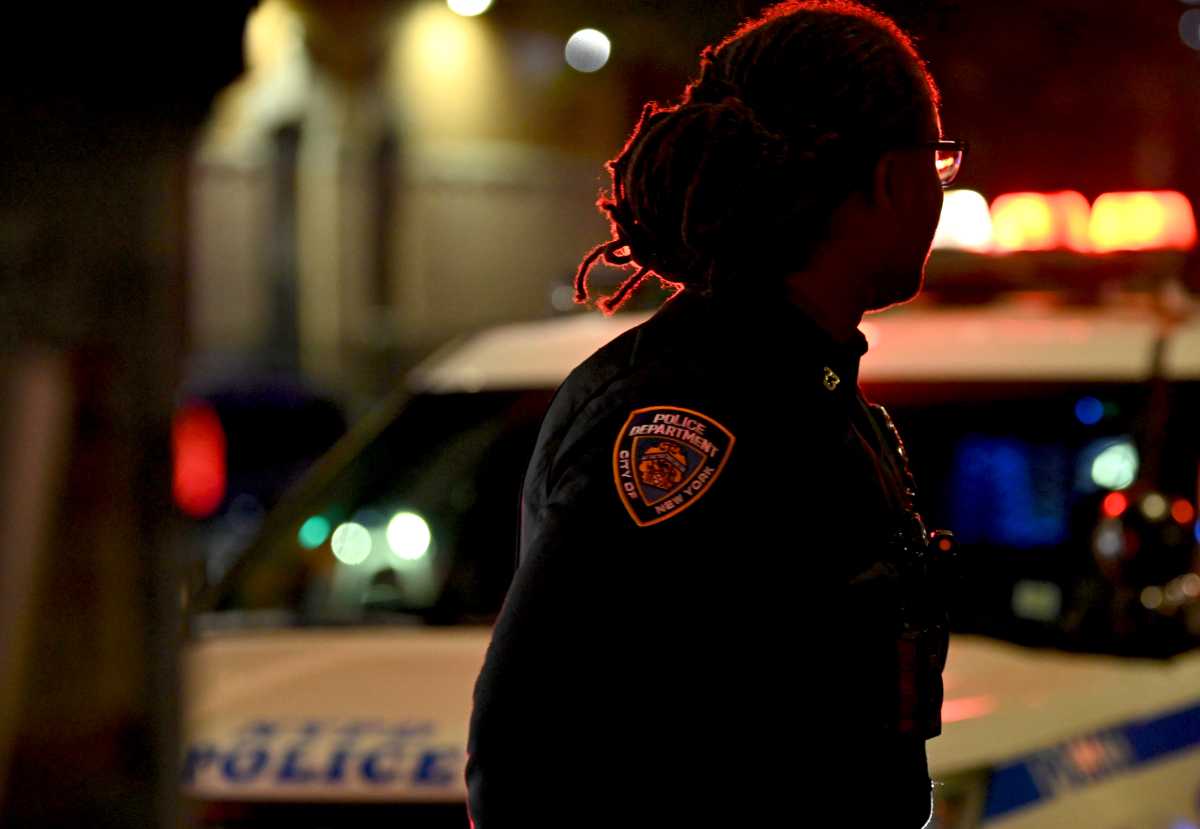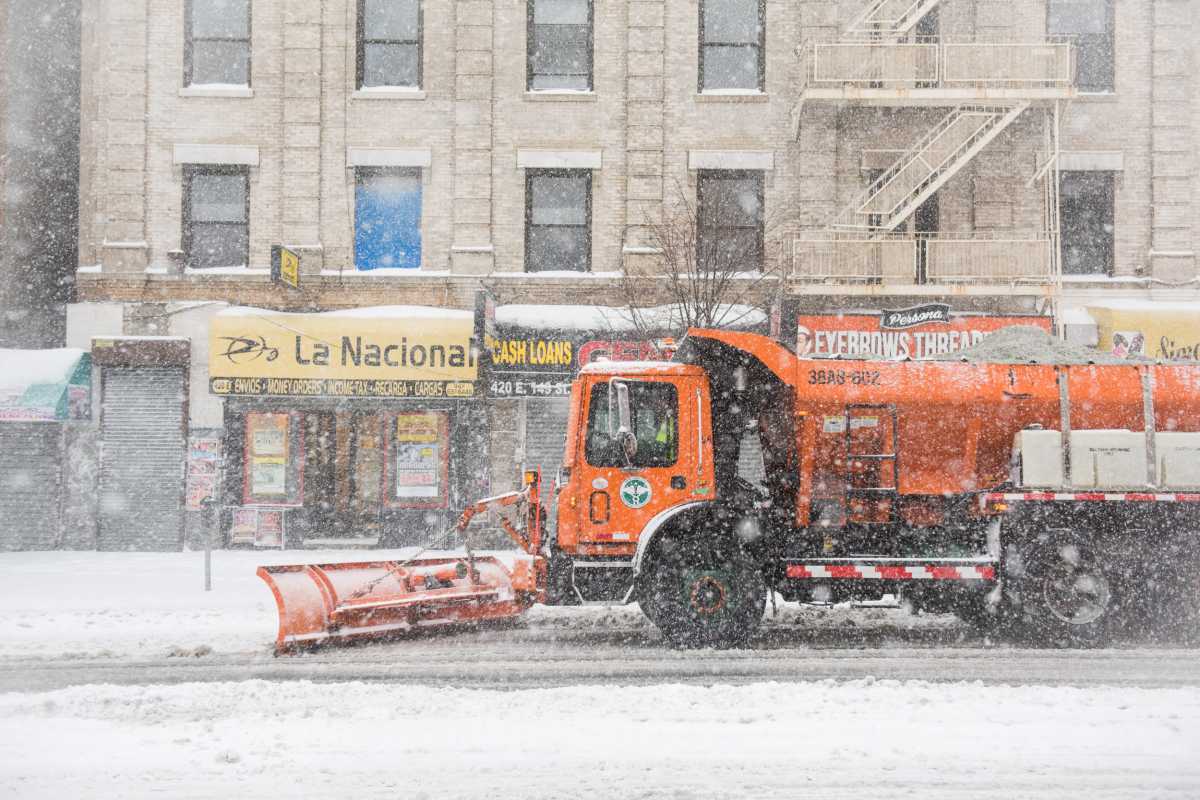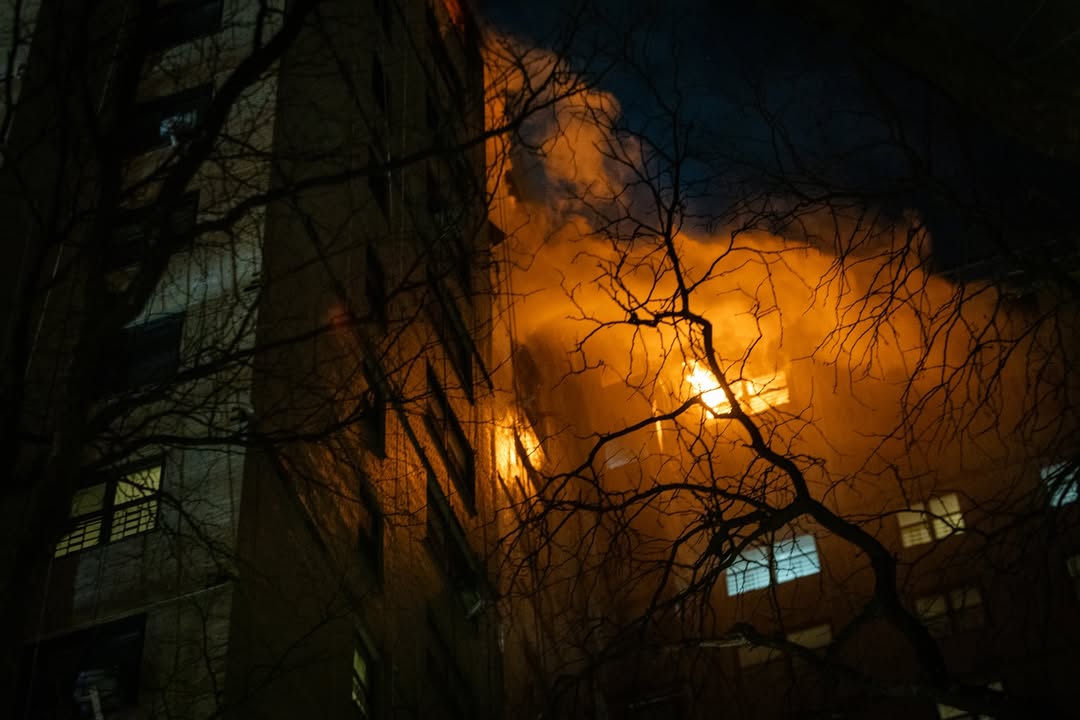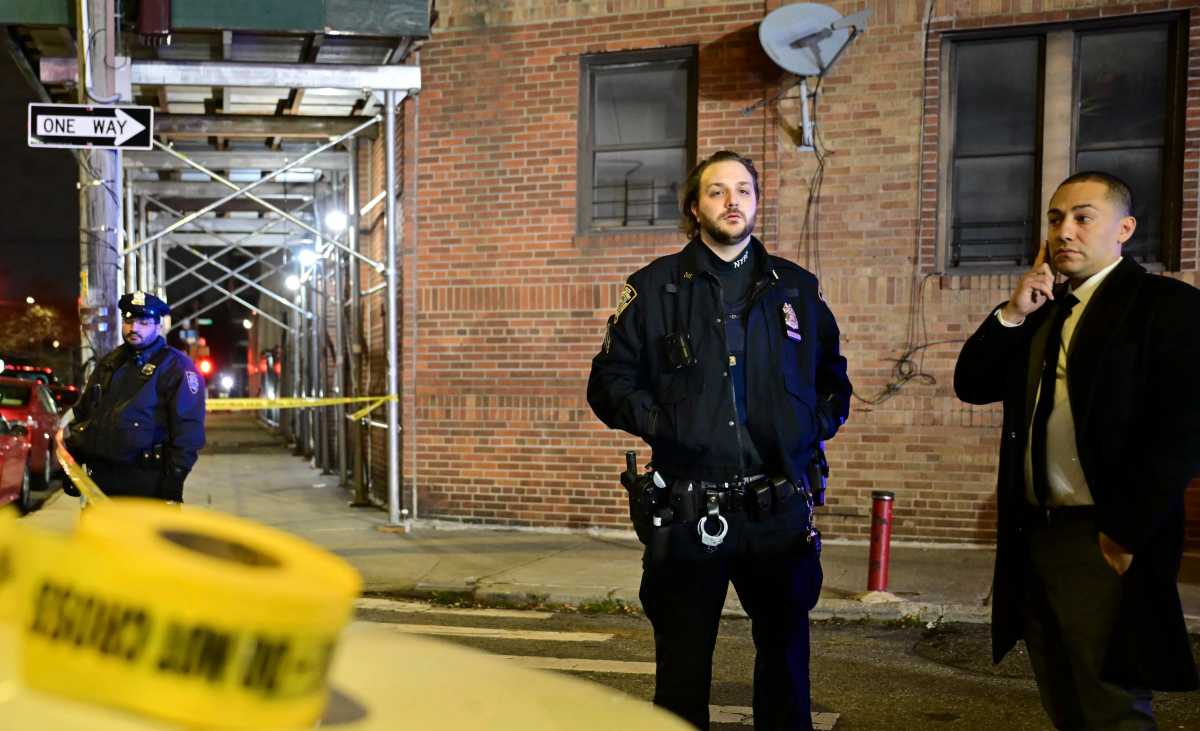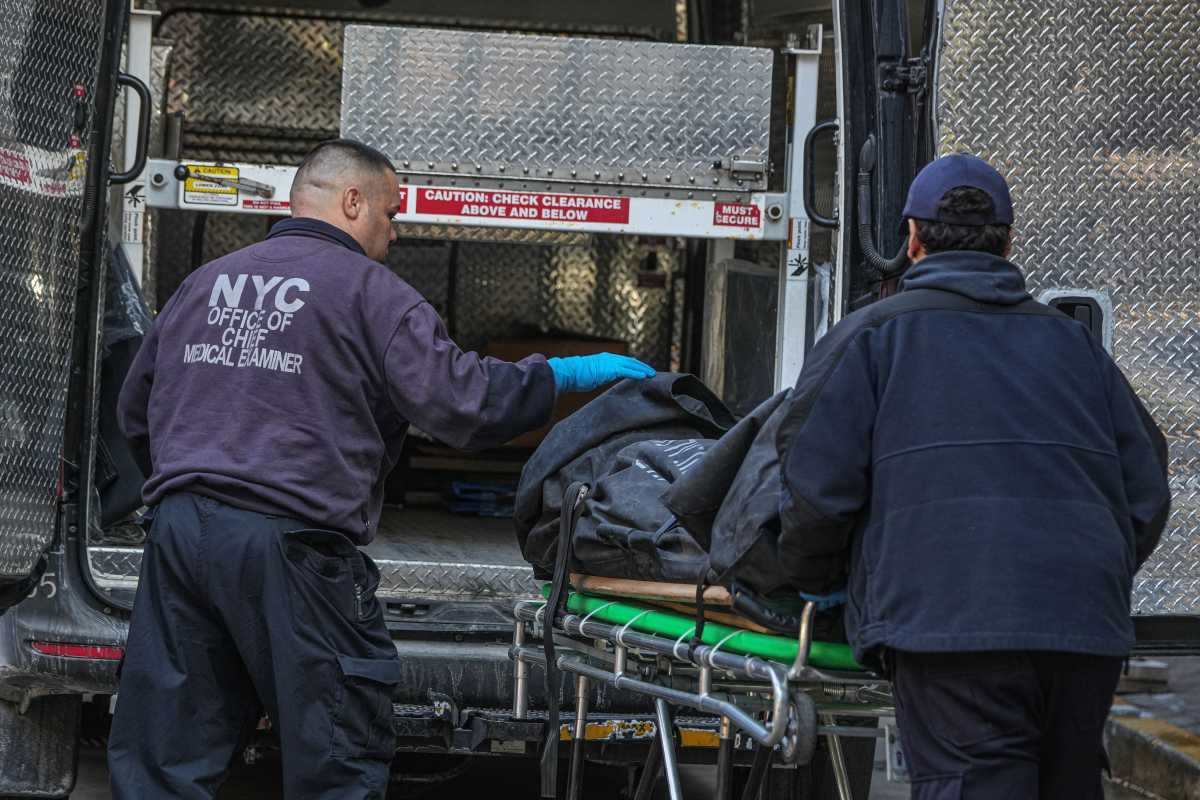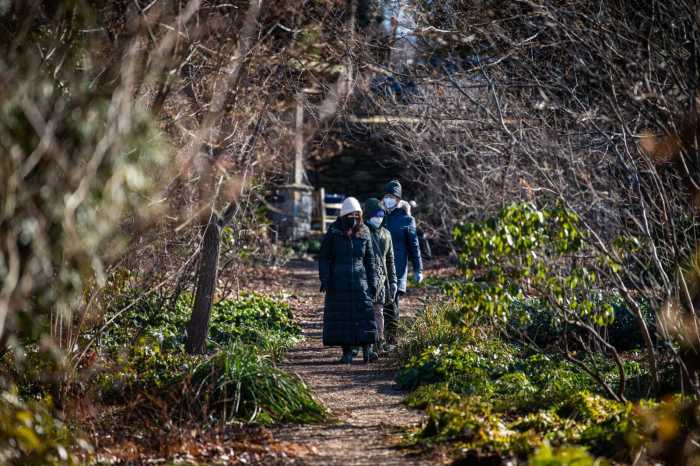As of Nov. 3, the Vernon C. Bain Correctional Center in Hunts Point — better known as the Rikers Island jail barge — is gone for good.
Starting just after 11 a.m., crews with Louisiana Scrap Metal, which was awarded a contract for the project, began cutting through the moorings and ropes that have anchored the barge to shore for more than 30 years. The removal of the massive vessel required coordination from the U.S. Army Corps of Engineers and Coast Guard, as well as local authorities.
Tugboats slowly pulled the barge away from shore and will haul it down to Louisiana, near the same area where the city obtained it from in the early 1990s. From there, it will be cut into scrap metal.
The Vernon C. Bain Center, anchored across the East River from the Rikers Island jail complex, could house up to 800 people when the city’s incarcerated population spiked to over 20,000 in the 1990s. It was meant to be a “temporary solution” to overpopulation but remained in place for decades thereafter.
The barge was a notorious fixture of the Rikers jails, which have been plagued by deaths from suicide, homicide and medical neglect.
The Department of Correction did not respond to the Bronx Times’ inquiry as to how many deaths occurred on the floating vessel itself and referred to a June statement by DOC Commissioner Lynelle Maginley-Liddie.
“As DOC modernizes and develops, we bid farewell to the retired Vernon C. Bain Center,” said Maginley-Liddie. “We look forward to a new vision for the community and are proud to do our part to facilitate this transfer. We also thank the many people who bravely served at the facility over the past three decades and who dedicated themselves to keeping our city and the people in our care safe.”
The barge was decommissioned as a correctional facility in 2023. In June 2025, Mayor Eric Adams and the New York City Economic Development Corporation (NYCEDC) announced bidding for the removal project and named Louisiana Scrap Metal the winner on Oct. 1.
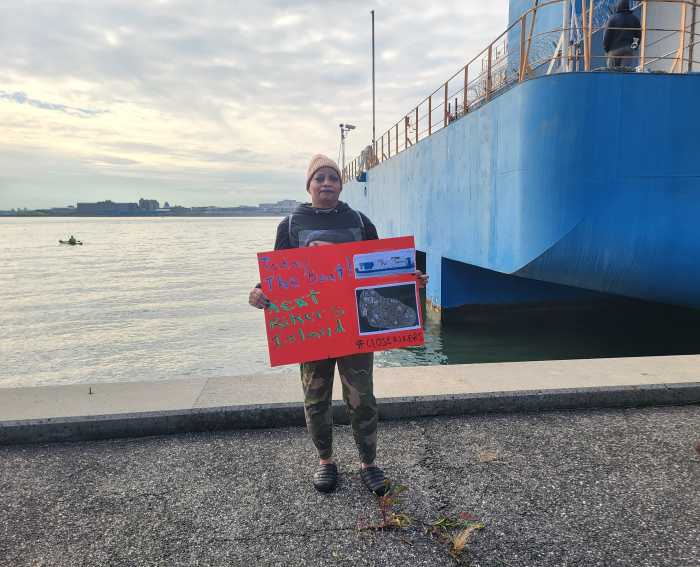
‘It all ends today’
As the barge left shore, cheers erupted from activists and families who had loved ones incarcerated there.
Edith Mayfield, a lifelong Bronxite who lives in Co-op City, attended the removal in honor of her late husband, Marvin Mayfield. He was arrested in 2007 and charged with cocaine possession and held at the barge for 11 months.
Throughout his time incarcerated, the prosecution never turned over the lab report that would have proved whether or not he was carrying a felony amount of an illegal substance, Mayfield said in an undated video interview with the Brooklyn Defenders.
He eventually succumbed to pressure to plead guilty and had to work to rebuild his life with a felony conviction. “It tore apart my family. Incarceration, it’s a nightmare,” he said in the video.
As Mayfield watched crews prepare the vessel for departure, “It all ends today,” she said. Mayfield said her husband didn’t share much about his experience living there until much later. “He experienced a lot of trauma,” she said. “They put a lot of people in here who needed treatment as opposed to jail.”
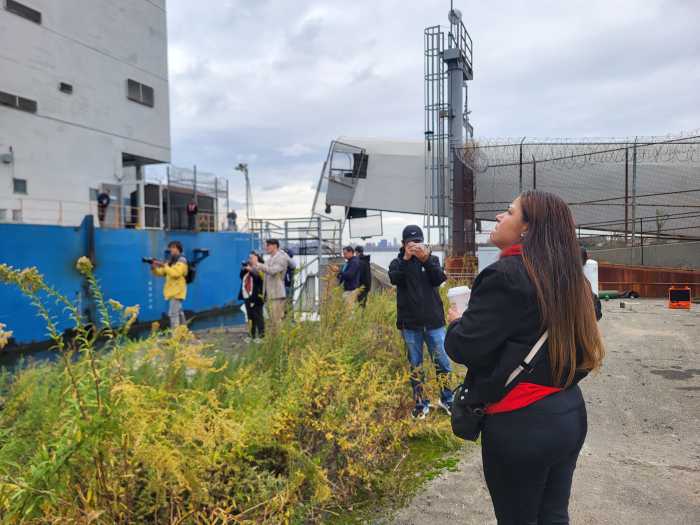
She said he returned home in Aug. 2017 and was able to “transform his life” with activism. His firsthand experience helped inform changes to the state’s bail laws and discovery reforms.
With the barge gone, Mayfield said she wants the city to better address the root causes of crime, whether addiction, mental illness or other factors.
“I’m hoping to see change, that people’s real needs are being met,” she said.
Lazandre Khadu of Bed-Stuy asked the Louisiana Scrap Metal team to send her a piece of metal as a memento of her son, 24-year-old Stephan Khadu, who died in custody at the barge.
Stephan was held there without bail for about two years and died a month before he was due to appear in court on charges of gang-affiliated conspiracy to commit murder and more. The medical examiner ruled he died of a meningitis infection, but Khadu said her son’s entire experience at Rikers was clouded in confusion and poor communication about his well-being.
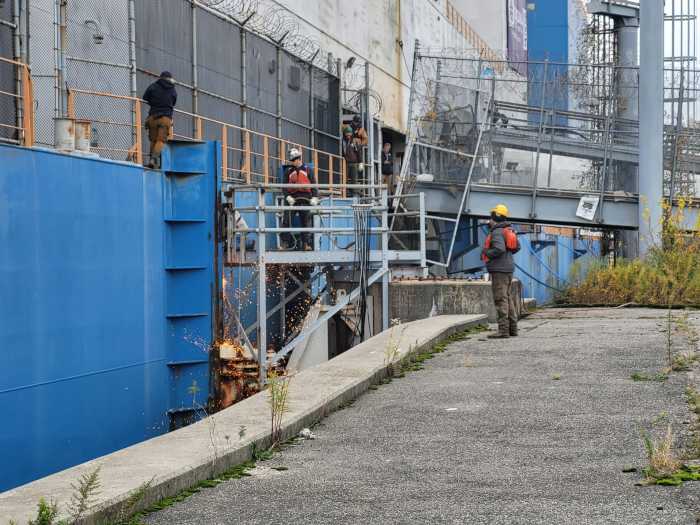
While in custody, Khadu said Stephan complained of sweltering heat in the summer, bitter cold in the winter and even mice droppings in the food. Sometimes when they spoke on a phone or video call, she could hear “a war going on” in the background, she said.
According to Khadu, she received a call in July 2021 from one of Stephan’s friends in custody, who said her son had suffered five seizures. He was very healthy and had no history of seizures, and doctors and corrections staff were not forthcoming about his condition, she said.
Khadu believes Stephan went a long period of time without prompt medical attention that day because other inmates had to start a commotion, including a small fire, in order for Stephan’s condition to be taken seriously by Rikers staff, she said.
Though he was later released from the hospital, his overall health seemed to go downhill, and he died in custody on Sept. 22, 2021.
Khadu said she still doesn’t fully understand what happened that day or in the months leading up to his death. But she remembers Stephan as a neat freak, football player and lover of mac and cheese, who was accustomed to easygoing family life with his two children, mom and dad, sister and four pet turtles, said Khadu.
Being present for the removal of the barge was “bittersweet,” she said, expressing relief that it is now relegated to the history books. “My grandkids, their feet will never touch this place.”
As the barge left shore, Khadu cheered and cried.
“Wow, this is really happening,” she said. “One stain out of New York.”
Khadu also shouted across the water to the roughly 6,000 people currently held at Rikers jails on land. “I’ll get you out of there too, period!”
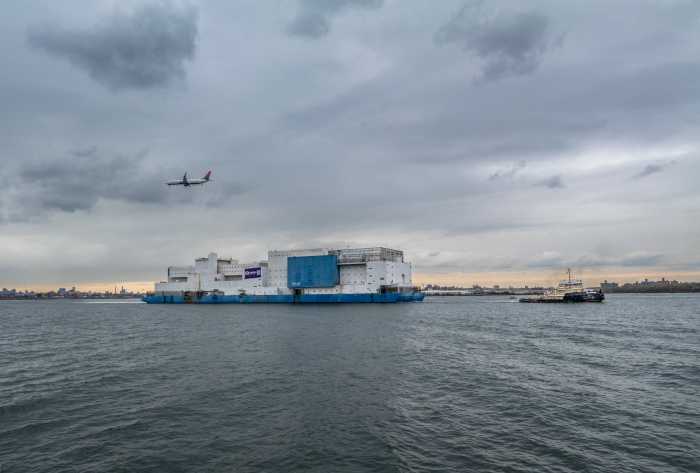
Turning incarceration into economic opportunity
With the barge gone, the city plans to transform the site into a marine terminal as part of a “blue highway” system, diverting truck traffic to the water instead.
Mayor Eric Adams, who announced the plan in June, said such a system would eliminate up to 9,000 truck trips in the South Bronx per month, helping reduce air pollution and asthma rates.
Overall, the project is expected to generate nearly $4 billion in total economic impact over 30 years, including 100 permanent jobs and 400 construction jobs upon completion, which is anticipated within the next five years, according to NYCEDC.
Louisiana Scrap Metal also paid the city $1.5 million for the right to own, break down and sell the barge components, said Randy Boudreaux, marine business development manager for the company.
He said he was “very honored that [the city] chose us to do this” and although the barge is massive, this project is “pretty similar to what we’ve done in the past.” After it floats to Louisiana for approximately 14 days, it will be stripped of combustible material and the metal cut into small pieces to sell to mills and foundries. The whole process will take about six months, Boudreaux said.
Although there was no official press conference, Deputy Mayor Adolfo Carrión Jr., who previously served as Bronx borough president and council member, attended the removal. He said the barge symbolized “in my estimation, an ugly chapter in New York City History,” adding that it was “wacky” to think of such a picturesque waterfront site being used to house hundreds of inmates.
Now, the city has a “phenomenal opportunity” to create an economic influx that will benefit the borough and all New Yorkers, Carrión Jr. said. “We’re plugging the Bronx into that.” He said the next mayoral administration must continue with urgency to develop the barge site, close Rikers jails and open the planned borough-based jails. “For the next mayor, it’s plug and play,” he said.
But for some activists, Adams’ action to remove the barge and close Rikers for good has already taken far too long.
Sarita Daftary, co-director of the nonprofit Freedom Agenda that advocates for reduced incarceration and the prompt closure of Rikers, said it was “meaningful” to see the center hauled away.
However, she said the administration is working to “stall, obstruct, undermine” the full closure of Rikers jails, which was set by law to be completed in 2027 but is now at least five years delayed, according to the Adams administration and a commission supporting its closure. “Rikers is undermining public safety, not creating it,” said Daftary.
Reach Emily Swanson at eswanson@schnepsmedia.com or (646) 717-0015. For more coverage, subscribe to our newsletter and follow us on Twitter, Facebook and Instagram!



